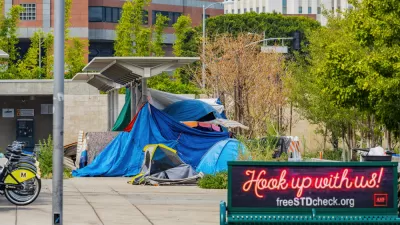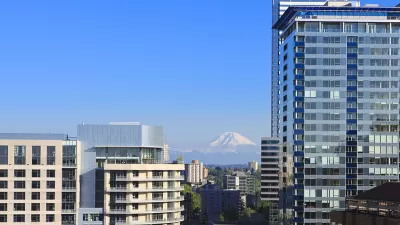As gas prices have fallen, driving has increased. October driving mileage figures show an increase of 3 percent from a year earlier. A shift away from public transit may cause transit providers to rethink expansion plans.
"It is too soon to say whether those Americans who are driving more are forgoing public transit, but an extended run of low gas prices could change the cost calculus for transit riders," writes Eric Morath covers the economy for The Wall Street Journal.
It's not too soon to see the results in Los Angeles, though. "(I)in fact, for every month that gas prices declined in 2014, so did the Los Angeles County Metropolitan Transportation Authority's ridership figures," writes transportation reporter Laura J. Nelson in the Los Angeles Times. "In the second half of the year, the number of riders systemwide fell by 4% compared with 2013."
But, experts say, don't be fooled: Although there appears to be a connection, correlation is not causation.
"Falling gas prices don't lead to much of a decrease in ridership, if any," Marlon Boarnet, a USC urban planning professor, said. "You're looking at zero to two percentage points change, at most."
Interestingly, many of the transit providers interviewed by Morath don't seem particularly concerned by the lowest gas prices in almost six years. Among the reasons: "(H)istorically, consumers were more likely to shift behavior in response to energy prices rising, rather than falling, transit experts say." In Los Angeles, "four in five Metro riders don't have access to a car, so low fuel prices won't significantly affect ridership," writes Nelson.
However, ridership has been increasing in recent years with rising gas prices. If that trend halts due to plummeting gas prices, the "shift could boost pressure on governments to re-evaluate their expansion plans for buses, subways and trains amid limited funding for infrastructure spending," notes Morath.
In fact, he points to states and cities that have already seen shifts in infrastructure investment spending resulting from failed ballot measures and political changes that took place last year.
On the local level, most transit-funding initiatives passed last year, but voters in Kansas City, Mo., and Austin, Texas, rejected measures intended to pay for transit expansion. Maryland elected a governor who favors road improvements over extending rail lines in Baltimore and elsewhere in the state.
One thing many may agree on, though, is that with the "Energy Information Administration (EIA) expecting prices to stay below $3 until at least 2017, this year is set to be a bellwether for public transportation," as Jacob Anbinder, a policy associate at The Century Foundation, the New York-based think tank, writes in The Week.
Note: Subscriber-only content to The Wall Street Journal article may be available to non-subscribers for up to seven days after Jan. 29.
FULL STORY: Transit Agencies Brace for Low Gas Prices to Siphon Away Riders

Maui's Vacation Rental Debate Turns Ugly
Verbal attacks, misinformation campaigns and fistfights plague a high-stakes debate to convert thousands of vacation rentals into long-term housing.

Planetizen Federal Action Tracker
A weekly monitor of how Trump’s orders and actions are impacting planners and planning in America.

In Urban Planning, AI Prompting Could be the New Design Thinking
Creativity has long been key to great urban design. What if we see AI as our new creative partner?

King County Supportive Housing Program Offers Hope for Unhoused Residents
The county is taking a ‘Housing First’ approach that prioritizes getting people into housing, then offering wraparound supportive services.

Researchers Use AI to Get Clearer Picture of US Housing
Analysts are using artificial intelligence to supercharge their research by allowing them to comb through data faster. Though these AI tools can be error prone, they save time and housing researchers are optimistic about the future.

Making Shared Micromobility More Inclusive
Cities and shared mobility system operators can do more to include people with disabilities in planning and operations, per a new report.
Urban Design for Planners 1: Software Tools
This six-course series explores essential urban design concepts using open source software and equips planners with the tools they need to participate fully in the urban design process.
Planning for Universal Design
Learn the tools for implementing Universal Design in planning regulations.
planning NEXT
Appalachian Highlands Housing Partners
Gallatin County Department of Planning & Community Development
Mpact (founded as Rail~Volution)
City of Camden Redevelopment Agency
City of Astoria
City of Portland
City of Laramie





























